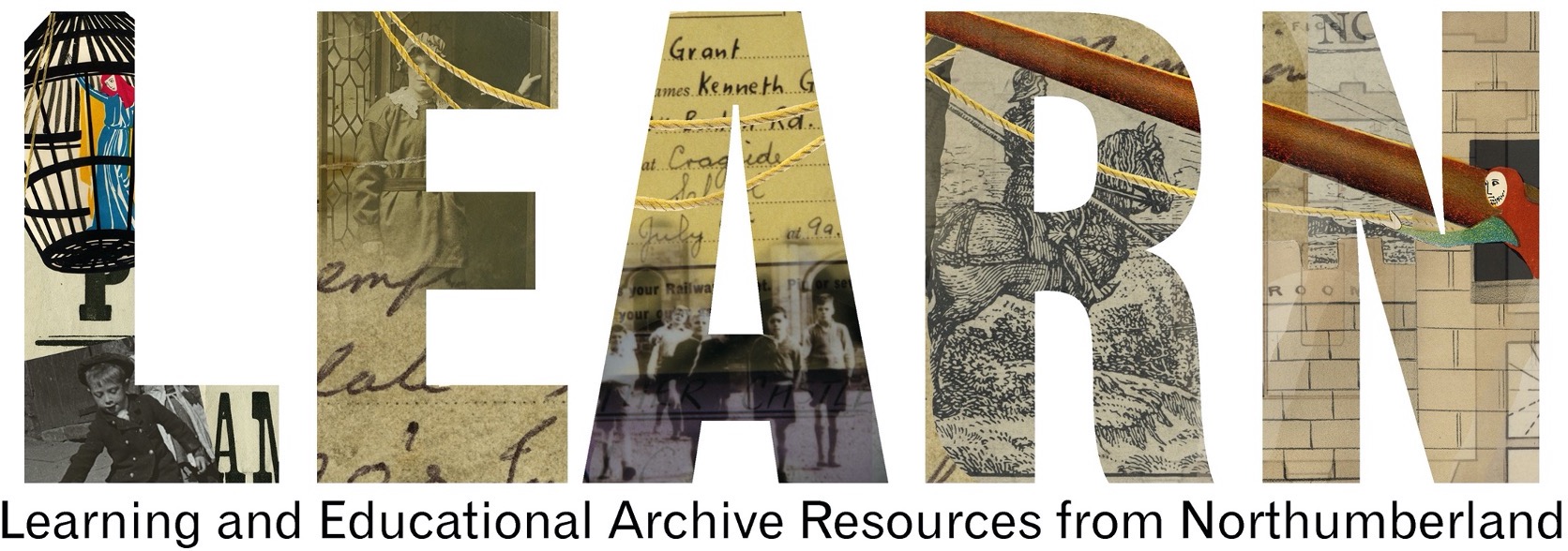Evacuation Oral Histories – Gordon B, Recorded 2008
Reference: T/493
Suggested age groups: KS1, KS2, KS3, KS4, Lifelong Learners
Subject areas: WW2
Download Word Document
Gordon B – T493 – Part 1
Gordon B – T493 – Part 2
CONTEXT
These sound files are extracts (short edited pieces) from longer oral history interviews that Northumberland Archives recorded. These interviews were made as part of a project to preserve the memories of people who had been evacuated to Northumberland as children during the Second World War.
For each person there is a short extract where they introduce themselves and one more extract where they talk about their experience of being an evacuee.
Gordon was born in Willington Quay during the mid-1930s. His father was a General Practitioner (doctor).
On 1st September 1939 Gordon was evacuated with his older sister. Gordon departed from Jesmond station to Alnwick, carrying with him a rucksack, a brown paper bag with sandwiches, and a cardboard box containing a gasmask. Gordon and his sister travelled with Newcastle Church High School; he was in the Kindergarten.
Gordon, his sister and two other girls stayed with the headmaster of the Duke’s School – very strict “disciplinarian”.
The children had to wait until after the family had eaten before they could eat. The children were served in kitchen, the family ate in dining room.
The headmaster blew a whistle at 6:30pm when the children were locked in their rooms until 8am. They didn’t stay very long.
Gordon changed schools part of the way through the war. He started going to Newcastle Preparatory School which had been evacuated to Eslington Hall (near Whittingham).
Gordon describes some of the boys’ activities – playing in the woods on the estate, Boy Scouts, debates, mock trials and snowball fights in the winter.
The village celebrated Wings for Victory week each year and put on a play of St George and the Dragon.
The boys weren’t aware of rationing, but were each given a tin of sweets which contained their sweet rations and were allowed a certain amount each day.
Each Christmas, the staff gave all of the boys a KitKat which had been saved up from their own sweet rations.
Photograph of Eslington Hall – NRO/10668/01/39

ACTIVITIES
ACTIVITY 1
Background
Gordon was born in Willington Quay during the mid-1930s. He was evacuated to Alnwick in 1939. Gordon changed schools part of the way through the war. He started going to Newcastle Preparatory School which had been evacuated to Eslington Hall (near Whittingham).
SEE
See: When was Gordon born?
See: Where did Gordon live?
See: When was Gordon first evacuated?
See: About how old was Gordon when he was first evacuated?
See: Where was Gordon first evacuated to?
See: How many times was Gordon evacuated?
See: Where was Gordon last evacuated to?
THINK
Think: Why were children evacuated during the Second World War?
Think: Who else, other than children, were evacuated during the Second World War?
Think: What types of areas were people evacuated from?
Think: What types of areas were people evacuated to?
Think: What types of factors were taken into consideration when deciding where children were evacuated from and where they were taken to?
Think: Do you think it was a good idea to evacuate Gordon to Alnwick and Eslington Hall?
DO
Do: Look at the data gathered by the War, State and Society Bombing Britain website, can you sort the data so that you can only see the bombings that took place in the North of England?
Do: Using the data from Bombing Britain, create a map showing the places that were bombed in the North of England.
Do: Using the data from Bombing Britain, create a table showing the five most bombed areas in the North of England.
Do: Using the data from Bombing Britain, create a table showing the five areas that sustained the most casualties in the North of England.
Do: Look at the Gen UKI website showing Newcastle evacuation data gathered by LNER. Create a map showing the areas that children from Newcastle were evacuated from and a map showing where the children were taken to.
Do: Compare your bombing map and your evacuation maps. Create an argumentative piece of writing arguing either for or against evacuating the children to or from these areas. Can you use evidence from the map and data from your tables to back up your argument?
Resources
http://www.warstateandsociety.com/Bombing-Britain
https://www.genuki.org.uk/big/eng/NBL/Evacuation/intro
https://www.iwm.org.uk/history/the-evacuated-children-of-the-second-world-war
https://www.youtube.com/watch?v=ZPs8hbksOg8
https://www.bbc.co.uk/teach/school-radio/history-ks2-world-war-2-clips-ww2-evacuation-index/zvs3scw
ACTIVITY 2
Background
Gordon Badenoch was born in Willington Quay in 1933. He was evacuated to Alnwick in 1939. Gordon changed schools part of the way through the war. He started going to Newcastle Preparatory School which had been evacuated to Eslington Hall (near Whittingham).
SEE
See: What did Gordon take with him when he was evacuated?
See: How was Gordon treated when he was hosted by the headmaster of the Duke’ School?
See: What types of activities did Gordon and the boys do at Eslington Hall?
See: How was Gordon treated at Eslington Hall?
THINK
Think: What type of background do you think Gordon came from?
Think: How was the evacuee experience shaped by the host family the child was placed with?
Think: Do you think Gordon had a positive evacuation experience?
Think: What was rationing?
Think: Why do you think Gordon and the boys weren’t aware of rationing at the time?
DO
Do: Think about how some evacuees had positive evacuation experiences and some had negative experiences. Role play a conversation between two evacuees with opposing experiences. Think about what might have caused these differences, such as their life at home, their background, where they were hosted and who they were hosted with.
Do: In groups, write a script for a scene from St. George and the Dragon. Perform your scene as part of the whole play with each group performing a different scene.
Do: In groups, take part in a mock trial. Is there someone mentioned in the oral history that you would like to accuse of a crime?
Do: In groups, debate the pros and cons of evacuation.
Do: Imagine you are Gordon. Write two postcards home – one from Alnwick and one from Eslington Hall. You could include a drawing of a scene that Gordon may have seen while evacuated on the front of each post card.
Resources
ACTIVITY 3
Background
These sound files are extracts (short edited pieces) from longer oral history interviews that Northumberland Archives recorded. These interviews were recorded as part of a project to record the memories of people who had been evacuated to Northumberland as children during the Second World War.
For each person there is a short extract where they introduce themselves and one more extract where they talk about their experience of being an evacuee.
SEE
See: Why were these oral histories recorded?
See: Who took part in these oral history interviews?
See: What is included in the oral history extracts?
THINK
Think: What is an oral history?
Think: Why is it important to record oral histories?
Think: What is the value of oral histories?
Think: Who might use oral histories?
Think: How reliable are oral histories?
Think: What types of oral histories might be recorded?
DO
Do: Imagine you are about to interview a former evacuee for an oral history. Write down a list of questions or talking points that you might use to prompt them during the interview.
Do: Write down a list of events that have taken place during your lifetime that you think it would be important to create oral history records of.
Do: Write down a list of events that have taken place before your lifetime that you think it would be important to have oral history records of.
Do: Look at the British Library, British Library Sounds and Imperial War Museum websites. Can you find oral history recordings about the events from your lists?
Do: Think of an event that you have experienced first-hand. In pairs, interview each other about your chosen events and create oral history recordings.
Do: Imagine you are Gordon, choose one part of his oral history interview and write a diary entry from his perspective of one of the events he describes.
Resources
OTHER ONLINE RESOURCES
Evacuation
Imperial War Museum website, page about child evacuation: https://www.iwm.org.uk/history/the-evacuated-children-of-the-second-world-war
You Tube website, British Pathe film of children being evacuated: https://www.youtube.com/watch?v=ZPs8hbksOg8
BBC Teach website, includes radio report of evacuation and interviews with children and host families: https://www.bbc.co.uk/teach/school-radio/history-ks2-world-war-2-clips-ww2-evacuation-index/zvs3scw
Rationing
Imperial War Museum website, page about rationing during the Second World War: https://www.iwm.org.uk/history/what-you-need-to-know-about-rationing-in-the-second-world-war
BBC Bitesize website, page about rationing: https://www.bbc.co.uk/bitesize/guides/z6ctyrd/revision/3
Oral History
Website for Oral History Society, includes definition of oral history: https://www.ohs.org.uk/
University of Leicester information sheet on oral history (pdf). Although the language isn’t the most accessible it does discuss value and reliability of oral histories: https://www.le.ac.uk/ur/emoha/training/no1.pdf
Website for Glasgow Women’s Library, blog discussing oral history project, includes definition: https://womenslibrary.org.uk/2017/08/09/what-are-oral-histories-and-why-are-they-important/
British Library website, page for oral history collections: https://www.bl.uk/collection-guides/oral-history
British Library Sounds website, includes oral history recordings: https://sounds.bl.uk/Oral-history
Imperial War Museum website page for oral history collections, one of the biggest oral history collections in the country. Many can be searched and listened to online: https://www.iwm.org.uk/collections/sound


